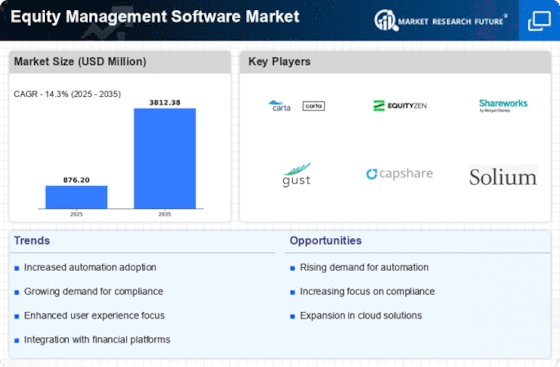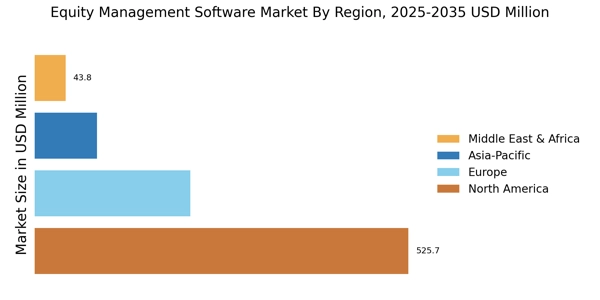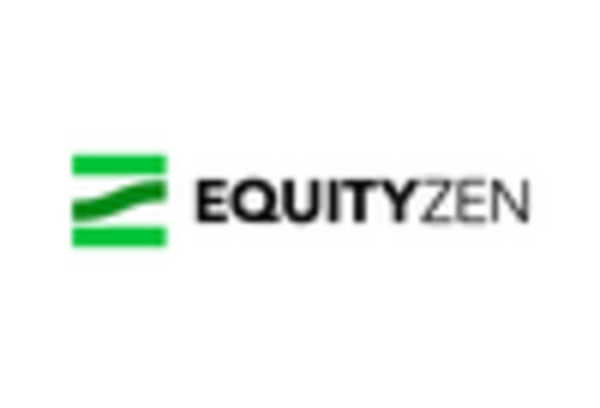Rise of Remote Work Culture
The shift towards remote work has significantly influenced the Equity Management Software Market Industry. As organizations adapt to flexible work arrangements, there is an increasing need for software solutions that can be accessed remotely. This demand for cloud-based equity management tools allows employees to manage equity plans from various locations, ensuring continuity and efficiency. Data indicates that companies utilizing remote-access equity management software have reported a 25% increase in employee engagement with equity plans. This trend highlights the necessity for adaptable software solutions that cater to the evolving work environment, thereby propelling growth in the Equity Management Software Market Industry.
Increased Demand for Automation
The Equity Management Software Market Industry is experiencing a notable surge in demand for automation solutions. Companies are increasingly seeking to streamline their equity management processes, which traditionally involve complex calculations and compliance requirements. Automation not only enhances efficiency but also reduces the likelihood of human error. According to recent data, the market for automation in equity management is projected to grow at a compound annual growth rate of approximately 12% over the next five years. This trend indicates a shift towards more sophisticated software solutions that can handle intricate equity structures and reporting needs, thereby driving the growth of the Equity Management Software Market Industry.
Regulatory Compliance Requirements
Regulatory compliance remains a critical driver within the Equity Management Software Market Industry. As financial regulations become more stringent, companies are compelled to adopt software solutions that ensure adherence to these evolving standards. The need for accurate reporting and transparency in equity management has never been more pronounced. Recent statistics suggest that firms investing in compliance-focused equity management software have seen a 30% reduction in compliance-related penalties. This trend underscores the importance of robust software solutions that not only facilitate compliance but also provide real-time insights into equity positions, thereby enhancing decision-making processes in the Equity Management Software Market Industry.
Growing Interest in Employee Equity Plans
The Equity Management Software Market Industry is witnessing a growing interest in employee equity plans as companies recognize the value of incentivizing their workforce. Equity compensation is increasingly viewed as a strategic tool for attracting and retaining talent. Recent surveys indicate that nearly 70% of companies are considering or have implemented equity plans to enhance employee engagement. This trend is driving the demand for sophisticated equity management software that can efficiently handle the complexities of these plans. As organizations strive to create competitive compensation packages, the Equity Management Software Market Industry is likely to see continued growth fueled by this interest in employee equity.
Technological Advancements in Software Solutions
Technological advancements are playing a pivotal role in shaping the Equity Management Software Market Industry. Innovations such as artificial intelligence and machine learning are being integrated into equity management solutions, enhancing their capabilities. These technologies enable predictive analytics, which can provide insights into market trends and employee behavior regarding equity plans. As a result, companies are increasingly adopting these advanced solutions to gain a competitive edge. Market analysis suggests that the integration of AI-driven features could lead to a 15% increase in operational efficiency for firms utilizing equity management software. This trend indicates a promising future for the Equity Management Software Market Industry as technology continues to evolve.

















